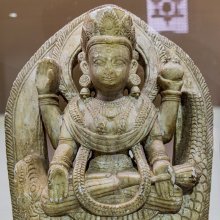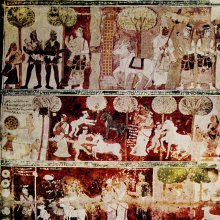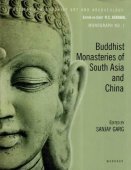Yamuna, Yamunā, Yāmuna, Yāmunā, Yamuṉā: 44 definitions
Introduction:
Yamuna means something in Buddhism, Pali, Hinduism, Sanskrit, Jainism, Prakrit, the history of ancient India, Marathi, Hindi, Tamil. If you want to know the exact meaning, history, etymology or English translation of this term then check out the descriptions on this page. Add your comment or reference to a book if you want to contribute to this summary article.
Yamuna has 42 English definitions available.
Images (photo gallery)
Languages of India and abroad
Sanskrit dictionary
[Deutsch Wörterbuch]
Source: Cologne Digital Sanskrit Dictionaries: Böhtlingk and Roth Grosses Petersburger WörterbuchYamunā (यमुना):—(yamunā [Uṇādisūtra 3, 61]) f.
1) Nomen proprium eines Flusses [Amarakoṣa 1, 2, 3, 31.] [Trikāṇḍaśeṣa 1, 2, 31.] [Hemacandra’s Abhidhānacintāmaṇi 1083.] [Halāyudha 3, 52.] [Lassen’s Indische Alterthumskunde I, 47. fg.] [Ṛgveda 5, 52, 17.] āva.indraṃ ya.unā.tṛtsavaśca [7, 18, 19. 10, 75, 5.] [Aitareyabrāhmaṇa 8, 23] (vgl. [The Śatapathabrāhmaṇa 13, 5, 4, 11).] [Śāṅkhāyana’s Śrautasūtrāṇi 13, 29, 25. 33.] [Pañcaviṃśabrāhmaṇa 9, 4, 11. 25, 10, 24. 13, 4.] [Kātyāyana’s Śrautasūtrāṇi 24, 6, 10. 39.] [LĀṬY. 10, 19, 9. 10.] [Aśvalāyana’s Śrautasūtrāni 12, 6, 28.] [Mahābhārata 3, 8217. 5, 7346. 6, 322.] [Harivaṃśa 3620. 5768. fgg. 9506.] [Rāmāyaṇa 2, 71, 6.] [Meghadūta 52.] [Varāhamihira’s Bṛhajjātaka S. 5, 37. 16, 2. 69, 26.] [Viṣṇupurāṇa 572.] [Oxforder Handschriften 46], b, [Nalopākhyāna 3.] tīrthamāhātmya [Weber’s Verzeichniss 144, 14.] mit yamī, der Zwillingsschwester Yama's, identificirt [Harivaṃśa 552. 6784.] [Mārkāṇḍeyapurāṇa 77, 7. 78, 30. 106, 3. 108, 19.] prati Beiname Viṣṇu’s [PAÑCAR. 4, 3, 147.] —
2) Nomen proprium einer Tochter des Muni Mataṅga [Kathāsaritsāgara 67, 74. fgg. 101, 151.]
--- OR ---
Yāmuna (यामुन):—
1) adj. zur Yamunā in Beziehung stehend, von ihr kommend, an ihr wachsend u.s.w.: srotasā yāmuneneva (so die ed. Bomb.) [Mahābhārata 7, 92.] jala [Harivaṃśa 14747.] [Spr. 829.] vaṃśaiśca (vanyaiśca ed. Bomb.) yāmunaiḥ [Rāmāyaṇa 2, 55, 8.] —
2) m. a) metron. [Pāṇini’s acht Bücher.4,1,113, Scholiast] [Oxforder Handschriften 127,a, No. 227.] — b) pl. Bez. eines Volkes [Mahābhārata 6, 358] [?(Viṣṇupurāṇa 190). Varāhamihira’s Bṛhajjātaka S. 14, 2. 25. Bhāgavatapurāṇa 1, 10, 34. Mārkāṇḍeyapurāṇa 58, 42.] — c) Name eines Berges [Mahābhārata 3, 12353. 5, 600.] gaṅgāyamunayormadhye yāmunasya gireradhaḥ [13, 3397.] [Rāmāyaṇa 4, 40, 19.] — d) Nomen proprium eines Autors [SARVADARŚANAS. 60, 2.] yāmunācārya [HALL 203.] yāmunācāryasvāmin [117.] —
3) n. a) (sc. āñjana) Spiessglanz [Amarakoṣa 2, 9, 101.] [Hemacandra’s Abhidhānacintāmaṇi 1051.] [Atharvavedasaṃhitā 4, 9, 10.] — b) Nomen proprium eines Tīrtha [Mahābhārata 3, 8022.]
Source: Cologne Digital Sanskrit Dictionaries: Sanskrit-Wörterbuch in kürzerer FassungYamunā (यमुना):—f. Nomen proprium —
1) eines Flusses. Wird mit yamī , der Zwillingsschwester Yama’s , identificirt. —
2) einer Tochter des Muni Matanga. —
3) einer Kuh Comm. zu [Kātyāyana’s Śrautasūtra 22,11,14.]
--- OR ---
Yāmuna (यामुन):——
1) Adj. zur Yamunā in Beziehung stehen , von ihr kommend , an ihr wachsend u.s.w. —
2) m. — a) Metron. von Yamunā. — b) Nom. pr. — α) Pl. eines Volkes. — β) eines Berges. — γ) eines Autors. Auch yāmunācārya und yāmunācāryasvāmin. —
3) n. — a) Schwefelantimon [Rājan 13,87.] — b) Nomen proprium eines Tīrtha.
Sanskrit, also spelled संस्कृतम् (saṃskṛtam), is an ancient language of India commonly seen as the grandmother of the Indo-European language family (even English!). Closely allied with Prakrit and Pali, Sanskrit is more exhaustive in both grammar and terms and has the most extensive collection of literature in the world, greatly surpassing its sister-languages Greek and Latin.
See also (Relevant definitions)
Starts with (+14): Yamuna acarya svamin, Yamunabhaj, Yamunabhid, Yamunabhratar, Yamunabhratri, Yamunacanakan, Yamunacariyar, Yamunacarya, Yamunacaryastotra, Yamunacharya, Yamunadatta, Yamunadvipa, Yamunai, Yamunaitturaivan, Yamunajanaka, Yamunaka, Yamunakalyani, Yamunamahatmya, Yamunamuni, Yamunanamani.
Ends with: Divyayamuna, Ganga-Yamuna, Sauyamuna, Suyamuna.
Full-text (+380): Jauna, Kalindi, Mecakapaga, Kalinda, Kalindakanya, Prayaga, Yamunabhratri, Yamunabhid, Antarvedi, Suryaja, Daivakari, Yamabhagini, Yamunajanaka, Dinakaratmaja, Suryatanaya, Tapanatanaya, Dviyamunam, Triveni, Shamanasvasri, Pratishthana.
Relevant text
Search found 140 books and stories containing Yamuna, Yamunā, Yāmuna, Yāmunā, Yamuṉā; (plurals include: Yamunas, Yamunās, Yāmunas, Yāmunās, Yamuṉās). You can also click to the full overview containing English textual excerpts. Below are direct links for the most relevant articles:
Garga Samhita (English) (by Danavir Goswami)
Verse 1.16.47 < [Chapter 16 - Description of Śrī Rādhikā’s Wedding]
Verse 2.2.8 < [Chapter 2 - Description of Girirāja Govardhana’s Birth]
Verse 1.11.49 < [Chapter 11 - Description of Śrī Kṛṣṇacandra’s Birth]
List of Mahabharata people and places (by Laxman Burdak)
Amarakoshodghatana of Kshirasvamin (study) (by A. Yamuna Devi)
Economics (3): Goods of trade < [Chapter 3 - Social Aspects]
Earth and its aspects < [Chapter 5 - Aspects of Nature]
Brihad Bhagavatamrita (commentary) (by Śrī Śrīmad Bhaktivedānta Nārāyana Gosvāmī Mahārāja)
Verse 1.7.50 < [Chapter 7 - Pūrṇa (pinnacle of excellent devotees)]
Verse 1.1.6 < [Chapter 1 - Bhauma (the earthly plane)]
Verse 2.1.90 < [Chapter 1 - Vairāgya (renunciation)]
Bhakti-rasamrta-sindhu (by Śrīla Rūpa Gosvāmī)
Verse 3.5.27 < [Part 5 - Conjugal Love (mādhurya-rasa)]
Verse 2.4.95 < [Part 4 - Transient Ecstatic Disturbances (vyābhicāri-bhāva)]
Verse 3.3.42 < [Part 3 - Fraternal Devotion (sakhya-rasa)]
Cosmetics, Costumes and Ornaments in Ancient India (by Remadevi. O.)
2.2. Pharmaceutical use of Añjana (Collyrium) < [Chapter 1 - Cosmetics]
Related products







